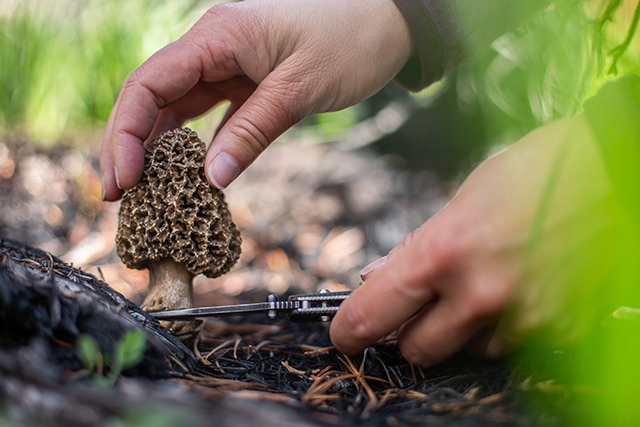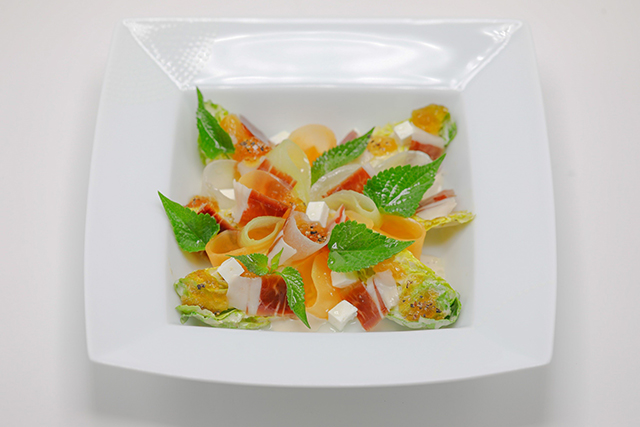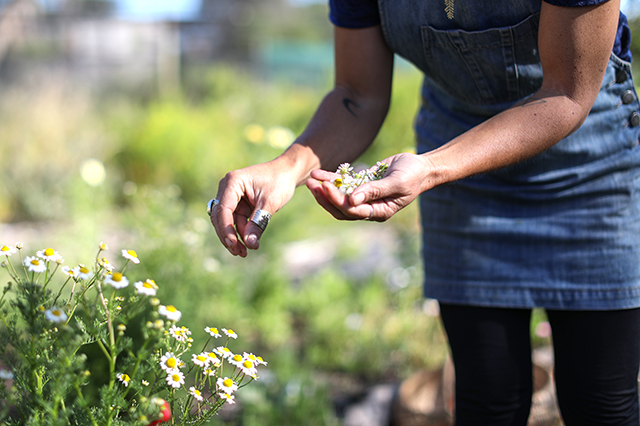Local flavor doesn’t get any more local than this.
Many farm-to-table (also known as farm-to-fork and field-to-table) restaurants across the Northeast are enlisting the help of foragers to add diversity to their inventory of ingredients.
Foraging is the act of looking – or hunting – for fresh, in-season fruits, vegetables, greens, herbs and mushrooms from the wild. Professional foragers have the knowledge and trained eyes to identify a wide variety of plants, honing their abilities to tell the difference between delicious wild ingredients and potentially inedible lookalikes.
Incorporating fresh, local and seasonal ingredients foraged from nature – whether it be forests, mountains, valleys or anywhere in between – elevates any dining experience. And restaurants are increasingly adding wild plants to their menus for flavor as well as ethical and environmental reasons.
The Truth About Foraging
Tama Matsuoka Wong is a professional forager and cookbook author based in New Jersey. She defines foraging as “harvesting wild plants for food, although what is ‘wild’ and ‘not so wild’ is not always a hard line.”
“Being an ‘artisan’ forager does require skill, and only gets better the more experience you have. Some people call this ‘wildcrafting,'” said Wong. “The rewards are that the plants become more multifunctional and delicious, once you determine the best time and way to pick it as well as how to prepare/cook it.”
Wong has been foraging informally since she was young. She remembers picking wild mulberries for her mother as child – though she didn’t call it foraging at the time.
Today, she forages herbs, greens, vegetables, fruits, nuts and seeds for the renowned Restaurant Daniel along with retailers like Fresh Direct, Farm to People and Natoora, which are looking for more local plant-based items.
Wong’s advice to the foraging-curious public is to educate yourself and practice.
“Learn about the plants around you, in your backyard or garden. Many are healthy and delicious,” said Wong. “Foraging them is a great way to become more self-sufficient as well as a convenient way to ‘grocery shop’ – you just need to stop trashing them as ‘weeds.'”
Foraging in the Northeast
If you’re interested in sustainability and fresh, delicious food, check out this list of restaurants in the Northeast that source ingredients from local and in-house foragers.
Connecticut
Miya’s Sushi – New Haven
Chef Bun Lai – whose mother opened Miya’s in 1982 – is a James Beard-nominated chef, an avid forager and sustainability activist, crafting seafood-, plant- and invasive species-based sushi and cuisine. While Miya’s Sushi brick and mortar location closed in 2020, it has “metamorphosed into an eatery in the woods where we hold intimate gatherings that foster a deeper connection between human beings and nature,” according to its website. “Additionally, Miya’s does pop-ups around the country and catering for special events.”
Harvest Wine Bar – Greenwich, New Haven, West Hartford and Westport
Harvest features modern American cuisine, including dishes with Asian, Latin and Mediterranean influences. The family-owned restaurant follows a “farm-to-fork” philosophy, supporting local and organic farms in order to serve fresh, seasonal and high-quality ingredients. Their mushrooms are sourced from a local mushroom forager located in Newtown, Conn.
Stone Row Kitchen + Bar – Willimantic
Stone Row Kitchen + Bar serves “homegrown” food. The menu showcases ingredients sourced from regional farmers, foragers and fishers. Some menu highlights include duck fat fingerling potatoes, grilled asparagus Benedict and the grass roots burger. Check out chef Tyler May’s seasonally inspired menus.
Find more farm-to-fork eateries in Connecticut. Want to try foraging? Find a class or tour in Connecticut near you.
Massachusetts
Forage – Cambridge, Mass.
This farm-to-table neighborhood bistro relies on partnerships with local farmers, fishermen and foragers to deliver modern twists on classic dishes. Fresh, seasonal ingredients make up much of the menu. Popular dishes include the fiddleheads & mushrooms, “One Local Cheese” course and lemon cake. See Forage’s dine-in menu here.
Deuxave – Boston, Mass.
Discover modern French cuisine at Deuxave, which sources quality ingredients from local farmers, fisherman and foragers. Chef/co-owner Christopher Coombs loves using seasonal, local ingredients – especially those from the Northeast. This is evident in menu items like the Rhode Island striped bass crudo, native lobster & spaetzle and spiced Long Island duck breast.
Find foraging tours and classes in Massachusetts.

New Hampshire
Black Trumpet – Portsmouth
This neighborhood bistro and bar offers dishes for a variety of diets, including gluten free, vegan and vegetarian options. Chef/owner Evan Mallett is an experienced forager who named both his restaurant and book, “Black Trumpet,” after the popular edible fungi. Mallett’s menu is inspired by ingredients from New England’s eight distinct seasons (early and late periods of each season).
Greenleaf – Milford
Greenleaf is a farm-to-table restaurant that sources its ingredients from local farms, foragers and fishmongers, including Northeast Family Fisheries, Three Rivers Farm Alliance and several farms. The menu takes inspiration from the seasons and local New England goods, with fare like the local cheese board and drinks like seasonally inspired cocktails and local craft beer.
Oak & Grain – New London
Oak & Grain’s menu features local and sustainable fish, meat and produce that are sourced from regional fishers, foragers and over 20 farms. Chef Bryan Leary is a forager himself and brings eggs from his own chickens and uses herbs from the inn’s gardens.
Discover foraging classes and tours in New Hampshire.
New Jersey
Park Place Café & Restaurant – Merchantville
Park Place is home to creative, modern dishes that highlight fresh, local and seasonal ingredients. The menu consists only of “the finest ingredients and wild foods we forage ourselves,” according to its website. Chef Phil Manganaro is a forager, and the restaurant also sources ingredients from local farmers and purveyors.
Crystal Springs Resort – Hamburg
Dinning at Crystal Springs Resort is a celebration of local fare, since a wide variety of menu items are sourced from local foragers. Foraged ingredients range from ramp bulbs, plum blossoms and wild ginger to five different types of mushrooms. See a sample menu.
Elements – Princeton
Elements features “Interpretive-American” cuisine by utilizing fresh, local ingredients. Executive chef/co-owner Scott Anderson and his team work with local farmers, foragers and butchers daily, prepping ingredients for the restaurant’s four-course tasting menu, nine-course chef’s tasting menu and a la carte options.
Find foraging tours and classes in New Jersey.
New York
Momofuku Ssam Bar – Manhattan
Home to some fantastic New York-inspired Korean food, Ssam Bar is part of the Momofuku Group, founded by chef David Chang. The menu features a mix of smaller dishes – ssam means “wrapped” – along with some larger fare and cocktails. Forager Evan Strusinski provides a variety of mushrooms, including black trumpet, maitake and yellow foot.
Foragers Table – Brooklyn and Chelsea
Foragers is a farm-to-fork style restaurant (in Chelsea), market (in DUMBO) and eatery and butcher’s counter (in Brooklyn) featuring clean, ethical food made from fresh, high-quality ingredients sourced from the Hudson Valley.

Daniel – Manhattan
This AAA Five Diamond French restaurant is based in Manhattan but sources its ingredients straight from nature. Resident forager Tama Matsuoka Wong supplies Executive Chef Eddy LeRoux with fresh, seasonal ingredients. The two also wrote “Foraged Flavor” together, a cookbook featuring wild plant recipes.
Find even more amazing farm-to-table New York restaurants. Or discover foraging tours and classes near you.
Rhode Island
Ocean House – Westerly
Hyper-local and seasonal ingredients are all part of the AAA Five Diamond experience at Ocean House, which boats its own in-house forager, Chef James McNamee.
Check out a Diamond Dish recipe from Ocean House.
Weekapaug Inn – Westerly
Farm-to-table dinning at the AAA Four Diamond Weekapaug Inn features modern interpretations of New England coastal cuisine. Menu items are created using traditional native foraging, local produce and fresh off-the-boat seafood.
Try this scallop recipe from Weekapaug Inn.
Find foraging classes and tours in Rhode Island.
Note: When in doubt, do not eat or touch mushrooms or plants you are unsure of. Do not forage on private property without permission.
What do you think about foraging? Are there any foraging-forward restaurants you’d like to visit? Tell us in the comments.















